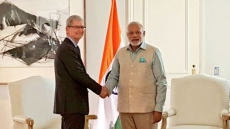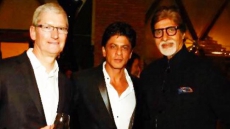India on Monday successfully tested its home-grown winged reusable launch vehicle (RLV), demonstrating its space technology prowess and joining an elite club of space-faring nations like the US, Russia and France.
"We have successfully tested the first delta-winged-body aerospace vehicle operating in hypersonic flight regime," the Indian Space Research Organisation (ISRO) said in a statement after accomplishing the mission as a technology demonstrator (RLV-TD).
"We have successfully accomplished the RLV-TD mission. The lift-off was at 7 a.m. from the first launch pad here," ISRO director Devi Prasad Karnik told IANS after the shuttle returned to the Earth.
President Pranab Mukherjee and Prime Minister Narendra Modi congratulated the Indian scientists.
Mukherjee, in a message, said: "Heartiest congratulations to ISRO Team on successful launch of India's first indigenous space shuttle RLV-T."
Modi said in a tweet: "The dynamism and dedication with which our scientists and ISRO (Indian Space Research Organisation) have worked over the years is exceptional and very inspiring."
The sleek 1.7-tonne RLV was latched on top of a 15-tonne rocket with a booster for lift-off from the spaceport here in Andhra Pradesh, about 80km north of Chennai, off the Bay of Bengal coast.
"We started the countdown for lift-off at 11 p.m. on Sunday and the rocket blasted off at 7 a.m., as the wind and weather conditions were good for launching the vehicle," ISRO's Vikram Sarabhai Space Centre (VSS) director K. Sivan told IANS later.
After 91.1 seconds into the flight, the burn out occurred while the rocket along its vehicle coasted to an altitude of 56km and separated to ascend to 65km above the earth in sub-orbital space.
From 65km height, the vehicle began its descent followed by atmospheric re-entry at Mach 5 (five times speed of sound).
"Navigation, guidance and control system steered the vehicle for safe descent to the defined landing spot over the Bay of Bengal, about 450km from Sriharikota on the east coast," the statement said.
The entire flight duration from launch to landing in the sea was 13.3 minutes.
Critical technologies such as autonomous navigation, guidance and control, reusable thermal protection system and re-entry mission management have been validated.
The vehicle was tracked during its flight from ground stations at Sriharikota and a ship-borne terminal.
"We have located the place where the vehicle is floating. The landing was soft as the vehicle was intact and did not break up on impact," Sivan claimed.
The Indian Coast Guard and National Institute of Ocean Technology extended support for the mid-sea wind measurement and ship-borne telemetry in the mission.
The space agency's telemetry, tracking and command network (Istrac) centre in Bengaluru recorded the data of the vehicle's hypersonic speed, autonomous landing and powered cruise flight using air-breathing propulsion.
The maiden mission has qualified India to enter the elite club of space-faring nations like the US (NASA), Russia (Roscosmos), France (European Space Agency) and Japan (Jaxa), which developed and used RLVs for their space missions over the years.
The seven-metre RLV prototype was used as a flying test bed to evaluate technologies the state-run space agency developed to reduce the cost of launching satellites into the earth's polar and geo-stationary orbits in the next decade.
"The long-term objective of this mission is to reduce the launch cost by 80 percent of the present cost by using a reusable vehicle," Sivan told IANS ahead of the test.
Rockets and support systems for launching satellites and space exploration missions are made at the space agency's VSSC at Thiruvananthapuram in southern Kerala.

Space agencies the world over spend on average $20,000 per kg to build and use medium-to-heavy weight rockets to launch satellites into the earth's polar and geo-stationary orbits, about 36,000km above the planet earth.
"In subsequent test flights, we will attempt to land the reusable vehicle at a specific location on land like an aircraft does on a runway so that we can again use it for launching satellites," Sivan pointed out.
The space agency is developing the RLV and its support systems from the budget earmarked annually for technology development and research and development activities.
The cost of developing the RLV technology is estimated to be about Rs.100 crore ($14 million).
"Developing the complex technology and using a reusable vehicle will take over a decade as we have to build them with our own resources," Sivan added.
The space agency will make two more RLV prototypes with additional features for other tests before the final version, which will be six times bigger than its demonstrators.
US-based billionaire Elon Musk's SpaceX and Amazon owner Jeff Bezos's Blue Origin have recently conducted similar test launches.
SpaceX tested its Falcon 9 rocket in December while Blue Origin's New Shepard completed a third launch and vertical landing in April.
NASA, however, grounded its space shuttle programme in 2011 after using its reusable vehicles like Discovery, Endeavor, Columbia and Challenger as a space transportation system for over three decades since 1981 to launch various missions, including International Space Station (ISS) and Hubble telescope.



